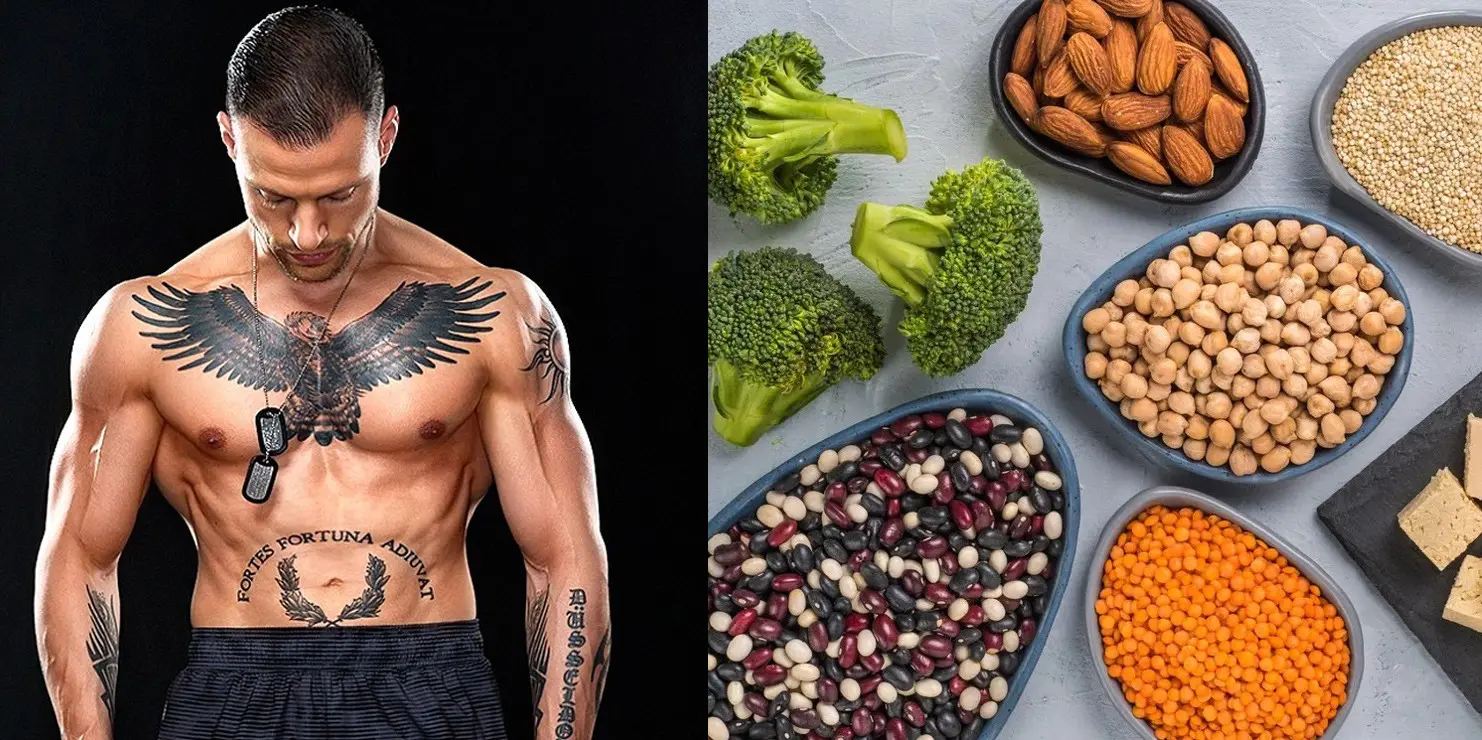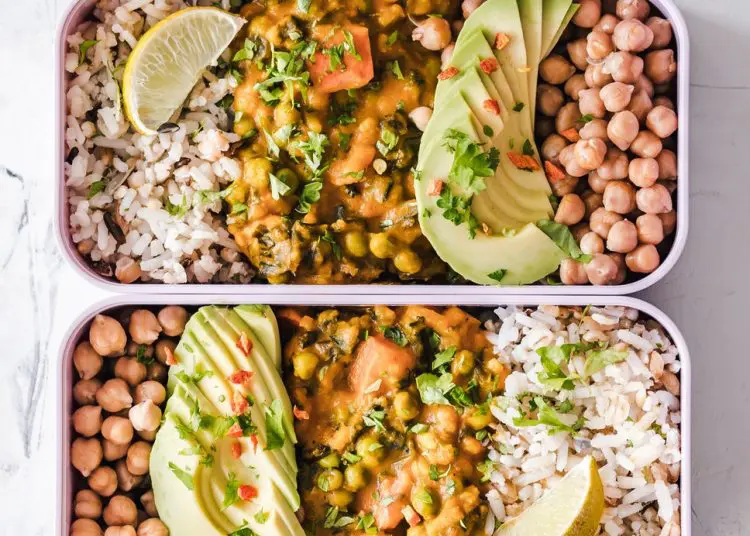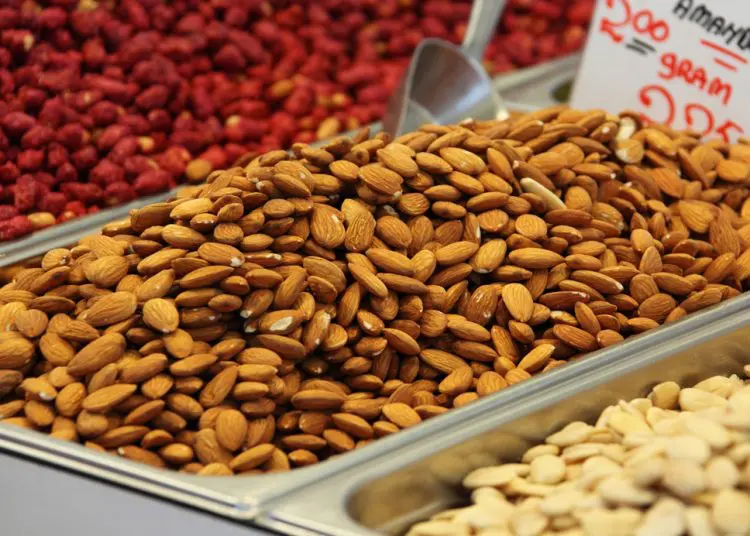A Guide to Vegan Bodybuilding
While adopting the vegan diet will bring drastic changes in nutrition habits and food choice, strength training should remain unchanged. Being consistent with the training principles of bodybuilding is the key to building size and strength.
With our training, it is imperative to focus on heavy, compound exercises for driving muscle growth. Compound exercises are “big” movements which require effort from multiple muscle groups across numerous joints. These exercises will have the biggest and most telling impact on muscle strength and size.
Secondly, remember to apply the training principle of progressive overload which involves gradually increasing the intensity of training over time.
This will continually force the body to change and allow for significant strength and size adaptations to occur.
The 4 Major Obstacles of Vegan Bodybuilding
There should be no differences in the methods of training adopted by both the vegan and omnivore bodybuilder. Evidently, the challenges that vegan bodybuilder face relates more to nutrition rather than training. Therefore, it should come as no surprise that the following 4 obstacles are all nutrition based.
1) Calorie Intake for Muscle Building
The major factor that will dictate body composition is calories. In bodybuilding, body composition will fluctuate regularly, depending on the physique goal and upcoming competitions.
Bodybuilders will go through multiple muscle-building and fat loss phases which both demand different calorie requirements.
During a muscle-building phase, calorie intake should be high in order to promote recovery from strength training and drive growth in muscle tissue.
Consuming enough calories during a muscle building phase can be challenging for any individual, let alone individuals adopting a vegan diet.
A plant-based diet typically means consuming fewer calories per day. Unfortunately, many foods that can help towards hitting a high-calorie target, are animal products.
However, that is not to say that high-calorie vegan foods don’t exist. Avocado, nuts, berries, dried fruits, rice, quinoa, and legumes are all great vegan-friendly products that can help to boost daily calorie intake and drive muscle hypertrophy. (1)
2) Protein Intake Challenges
Due to the reduced number of foods that can be consumed, the vegan bodybuilder may struggle to consume an adequate amount of protein per day. Consuming enough protein is vastly important for all individuals but is of high significance and importance for those who partake in regular strength training.
Protein plays a key role in repairing and rebuilding muscle that has been damaged through the stresses of strength training. By failing to consume enough protein each day, we risk hampering our muscle and physique building progress as recovery will not be optimized. Studies have indicated that a high protein diet can have a positive impact on body composition. (2)
The majority of high-quality protein sources tend to be animal-based – meat and dairy products, for example. As a result, the vegan may find consuming enough protein per day exceedingly difficult.
While foods such as legumes, pulses, and nuts do contain a decent amount of protein, they contain a significant amount less than the majority of animal-based foods. This is not to say that vegan bodybuilders cannot build muscle mass without animal protein, however.
Vegans have the same potential for muscle growth as omnivores providing they consume enough calories and protein from other sources.
The typical recommendation for protein per day is 1 gram per pound of bodyweight. If a vegan struggles to consume the right amount of protein, it may be necessary to find a vegan-friendly protein supplement in order to manage and fulfill their daily protein requirements.
AMPLE meal replacement company offering a real food based go-to vegan meal replacement shake Ample V that focuses on pea brown rice protein.
3) Macronutrient Balancing for Leanness
When in a muscle building phase, the primary focus should be on calorie intake. While balancing macronutrients (fats, proteins, and carbohydrates) is important, it is not the primary driver of muscle growth. However, when attempting to reduce body fat, macro balancing becomes of greater importance.
As mentioned in the above section, protein is needed for maintaining muscular size while dropping body fat. Carbohydrates meanwhile are the primary source of energy for the body and fats are essential for the absorption and transportation of nutrients.
Studies have indicated that, while macro balancing is of less importance than calorie intake for improving leanness (4), selecting the correct balance is important for maintaining muscle size and enhancing physique during this phase. (5)
4) Micronutrient Deficiencies and Muscle Health
Micronutrients are vitamins, minerals and trace chemicals which drive growth and play a key role in numerous bodily functions. Specifically, micronutrients help promote immune health, energy production, blood clotting, growth, bone health, muscle health and fluid balance – just to name a few!
Being deficient in any micronutrient can cause a whole host of health issues and lead to problems with growth and development. A few examples of some essential micronutrients are Vitamin A, B, C, D, calcium, iron, and zinc.
An important role played by micros is in energy generation for physical activity and subsequent recovery from that activity. Performing regular strenuous activity may require higher doses of micronutrients in order to deal with the exercise demands.
Additionally, due to the vegan diet and the avoidance of animal-based products, vegans can be especially susceptible to deficiencies in vitamin B6, D, iron, calcium, riboflavin, and alpha-linolenic acid. As with protein, it may be appropriate to supplement these micronutrients to ensure the body receives enough to maintain health, function and fight fatigue. (6)
Vegan Bodybuilder Workout and Nutrition Plan
Here is an example of a classic bodybuilder’s 5-day split:
| Day | Exercise | Sets x Reps |
| Monday Chest |
Barbell Bench Press
Incline Dumbbell Bench Press Dumbbell Pullovers Cable Flyes |
4 x 6
4 x 6 4 x 6 – 12 |
| Tuesday Back |
Barbell Deadlift
Dumbbell Bent Row Lat Pulldowns Straight Arm Pulldowns |
4 x 6
4 x 6 4 x 6 – 12 |
| Wednesday Rest |
– | – |
| Thursday Shoulders |
Barbell Overhead Press
Seated Dumbbell Press Cable Face Pulls Dumbbell Front / Lateral Raises |
4 x 6
4 x 6 4 x 6 – 12 |
| Friday
Legs |
Barbell Back Squat
Dumbbell Walking Lunges Leg Extensions Leg Curls |
4 x 6
4 x 6 4 x 12 – 15 |
| Saturday
Arms |
Barbell Bicep Curl
Dumbbell Tricep Extensions Cable Tricep Pushdowns Dumbbell Hammer Curls |
4 x 6
4 x 6 4 x 12 – 15 |
| Sunday
Rest |
– | – |
This is an example of vegan nutrition plan that will effectively keep vegans on the right track with muscle growth:
Meal 1 (Breakfast):
1 cup of granola
2 scoops of vegan protein with rice / oat milk
1 banana
Meal 2 (Mid-Morning Snack):
Smoothie
(Rice/ Oat milk, banana, blueberries, almond butter)
1 bagel with peanut butter
Meal 3 (Lunch):
300g of wholewheat pasta
150ml of vegetable pasta sauce
Drop of olive oil
1 orange
Meal 4 (Late-Afternoon Snack):
1 rice cake
1 slice of wholegrain bread with peanut butter and jam
1 apple
Meal 5 (Dinner):
200g of tofu
200g of brown rice
200g of vegetables (i.e broccoli, spinach, asparagus, carrots)
Meal 6 (Late-Evening Snack):
Protein shake – Rice / Oat Milk
Final Word
Lastly, be sure to prioritize recovery from training to ensure optimal adaptations take place. Getting enough sleep, consuming a healthy vegan bodybuilding diet and scheduling in ‘deload’ weeks are all essential for recovery. (7)
It is clear that vegan bodybuilding can present challenges which typically revolve around nutrition. Nonetheless, through adequate planning and consistency with both nutrition and training, great progress in terms of muscular and physique development can be made.
References:
- – https://www.health.harvard.edu/staying-healthy/the-right-plant-based-diet-for-you
- – https://www.ncbi.nlm.nih.gov/pmc/articles/PMC4617900/
- – https://www.nejm.org/doi/10.1056/NEJMoa0804748?url_ver=Z39.88-2003&rfr_id=ori%3Arid%3Acrossref.org&rfr_dat=cr_pub%3Dwww.ncbi.nlm.nih.gov
- – https://link.springer.com/article/10.2165/00007256-200434050-00004
- – https://www.ncbi.nlm.nih.gov/pubmed/10746356
- – https://www.ncbi.nlm.nih.gov/pubmed/24998610
Tip: If you're signed in to Google, tap Follow.












Bodybuilding as a vegan requires careful planning and thought, but then all good things take a bit of effort.
Vegans especially should ensure they take in enough micronutrients vitamin B12 and vitamin D.
I cover some of the aspects a vegan should look for when building muscle in a recent post:
Hopefully some may find it helpful. Cheers!